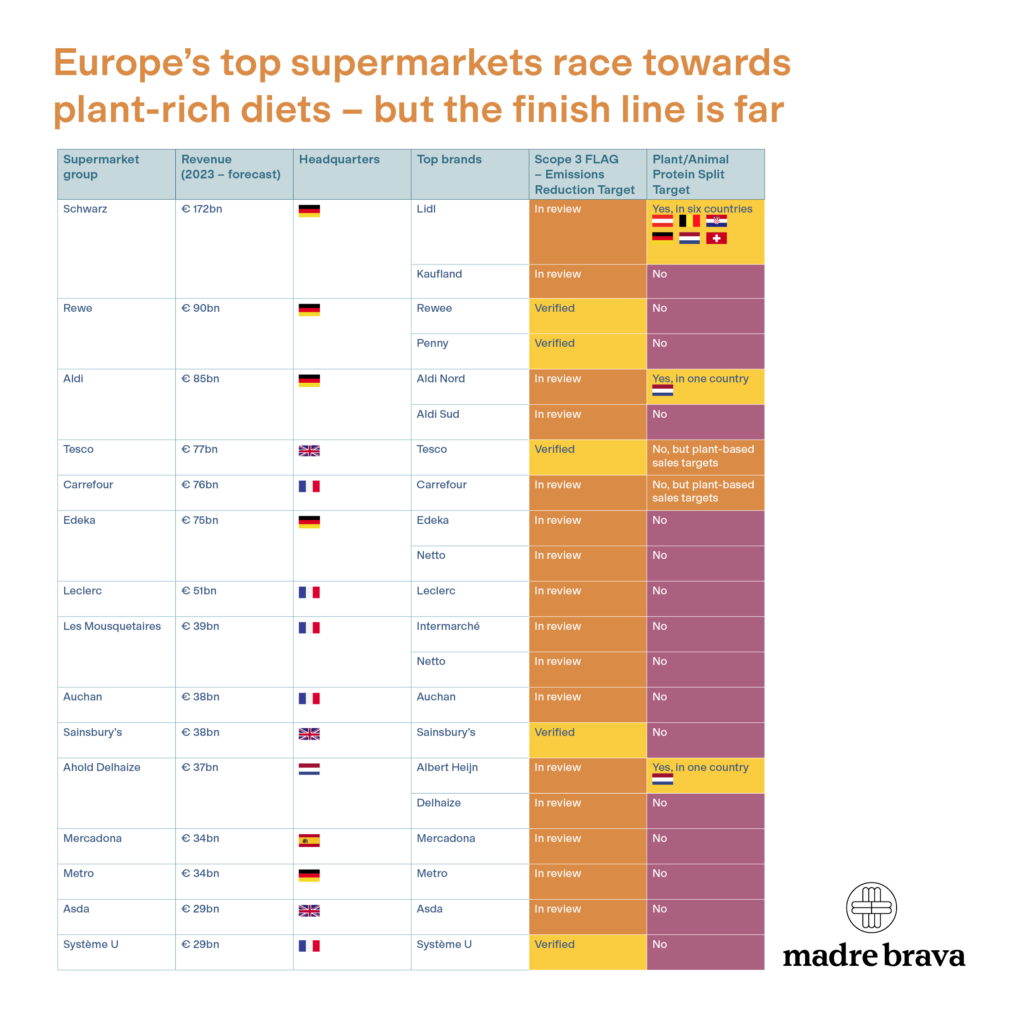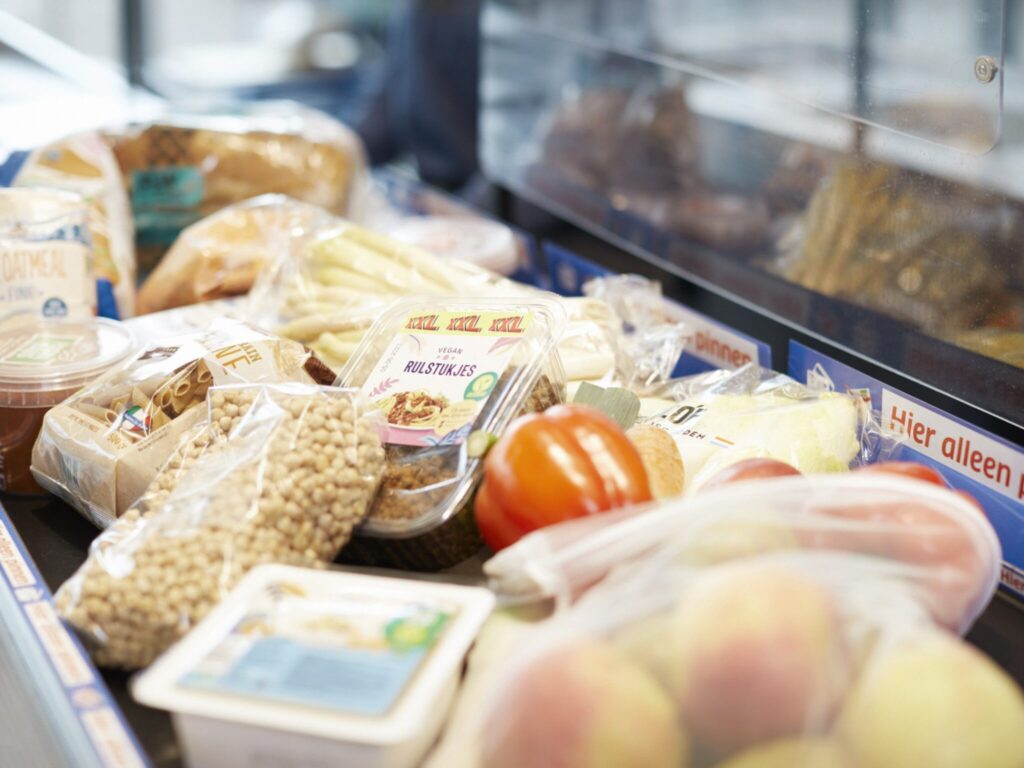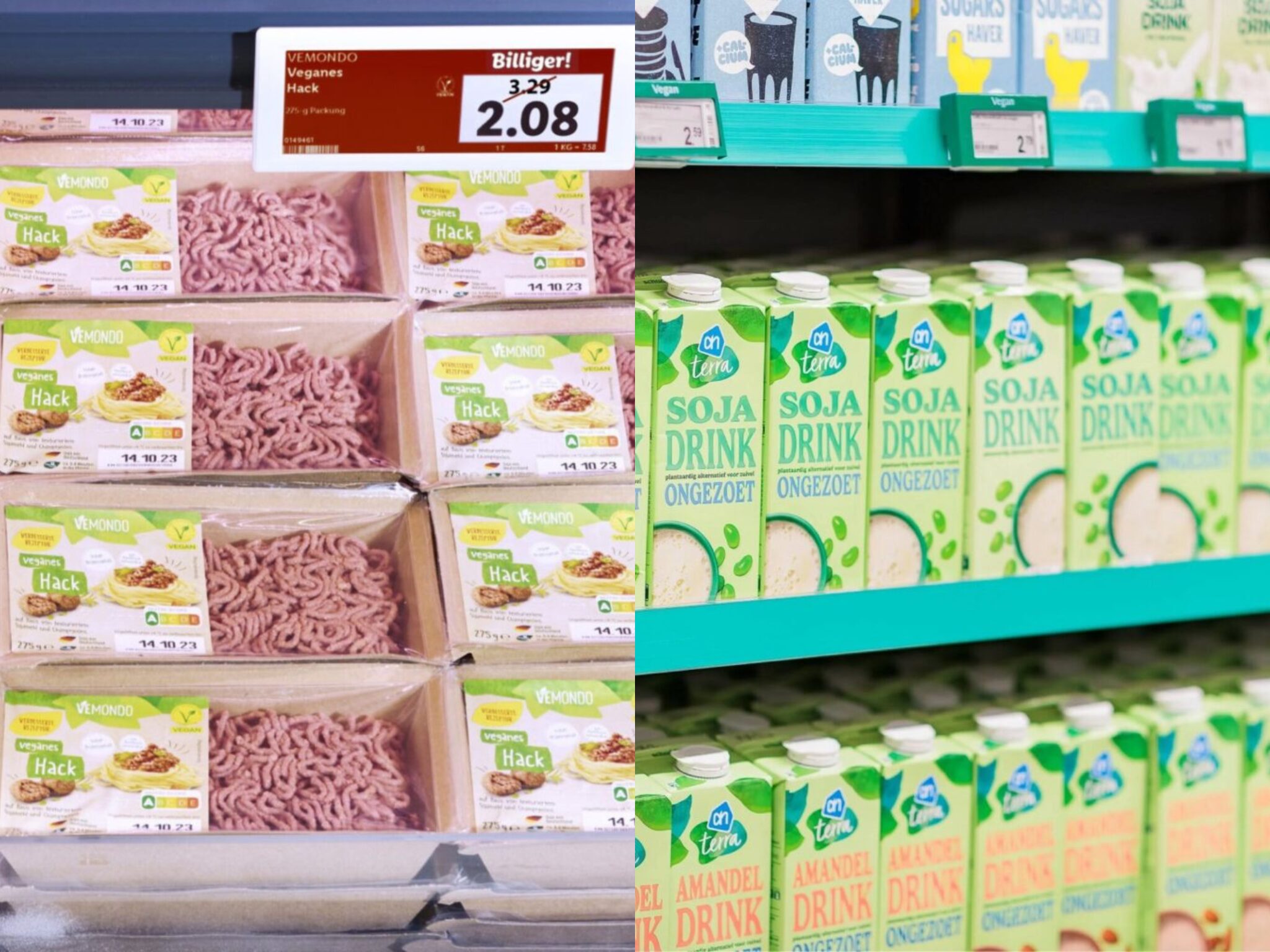Lidl, Ahold Delhaize in Race to Be World’s First Retailers to Align Protein Sales with Climate Goals
7 Mins Read
Europe’s supermarkets are increasingly pledging more plant protein offerings, spearheaded by Lidl and Ahold Delhaize. A mass transition is still far away, though.
While each of Europe’s 15 largest supermarkets has set targets to reduce emissions from their food sales, only five have made commitments to increase their sales of plant proteins, according to research by Madre Brava.
This is despite meat and dairy driving nearly half (47%) of all emissions from food retailers in Europe. Germany’s Lidl and the Netherlands’ Ahold Delhaize lead the race, vying to be the world’s first retailers to align their protein offerings with climate targets.
It means that even though food is the main source of Europe’s consumption-based emissions, two-thirds of the continent’s biggest retailers aren’t doing enough to lower their impact. But a faster transition towards plant-rich diets is needed for “health, climate and affordability” reasons, says Nico Muzi, managing director of Madre Brava.
“First, the transition helps rebalance protein sales to meet health goals in line with the most advanced dietary guidelines in the EU. Second, supermarkets can’t meet climate goals without rebalancing their protein sales. Third, supermarkets can make legumes and plant-based alternatives cheaper and more accessible, especially for low-income families,” he tells Green Queen.
A 2023 study by Profundo for Madre Brave found that if Ahold Delhaize, Carrefour, Lidl and Tesco replaced half their meat sales with plant proteins by 2030, they’d save emissions equivalent to taking 22 million cars off the road, land the size of Portugal, and water equivalent to 228,000 Olympic-size swimming pools every year.
Lidl and Albert Heijn aim to be ‘leaders, not laggards’

Only three retailers in the analysis have set targets for splitting animal and plant protein sales. Lidl is working towards public targets across its locations – it has published such goals in six countries, and others will soon follow suit. “Doing so within this year could potentially turn Lidl into the first supermarket chain to publicly commit to align their protein offerings with human and planetary health goals,” says Madre Brava.
Meanwhile, Albert Heijn – a subsidiary of Ahold Delhaize – has agreed to make 60% of all protein sales plant-based by 2030, as part of a larger commitment by Dutch retailers. And by the end of this year, all of its food retail brands will set targets to sell a greater share of plant proteins and fewer animal-sourced foods.
One of the main factors behind Lidl and Ahold Delhaize’s progress is the fact that they’re headquartered in countries “at the forefront of the protein transition globally”, says Muzi (more on that later). There’s the climate imperative too. “Since meat and dairy are the largest sources of emissions in a supermarket’s operations, targets to rebalance protein sales are a critical move to achieving net-zero climate goals too,” he explains.
He cites Carrefour’s statement to Madre Brava, which acknowledged that a shift from animal to plant proteins will be necessary to achieve its scope 3 emissions targets. “Some food retailers – because of their own ambition and market size – want to position themselves as leaders, not laggards. It seems Lidl and Ahold Delhaize want to lead the protein transition race,” he says.
“Having said that, they need to go further: Lidl and Ahold Delhaize need to set public targets to rebalance their protein sales to achieve [a] 60% plant, 40% animal protein split by 2030 across all the countries they operate in. And they need to do so by lowering the price of both whole foods and plant-based meat and dairy alternatives to help consumers follow healthier, more sustainable diets.”
Aldi Nord – which operates in northern, eastern and west Germany plus seven other EU countries, and is the parent company of Trader Joe’s in the US – has also committed to a 60/40 protein transition target by 2030, but only in the Netherlands.
Elsewhere, Carrefour and Tesco have set goals to increase their plant-based sales, but these don’t target a reduction in animal products. In November 2022, Carrefour aimed to boost plant protein purchases by 65% by 2026, but it exceeded the goal within a year, reaching €514M. Now, it has revised this to over €650M, and committed to providing annual updates on this metric. And in the UK, Tesco wants to triple its plant-based sales by 2025 (compared to 2018).
So what’s stopping the rest? “This is a new field of action for retailers: the race just started,” explains Muzi. “As in other transitions, you have leaders who are willing to move first and laggards who follow.
“Given that plant/animal protein split targets are beginning to deliver on their promise to help consumers buy more plant protein products at affordable prices and reduce their meat and dairy purchases, more and more supermarkets will follow. And as demand increases for plant-based meat and dairy products and legumes, supply will get better and cheaper.”
Why the Netherlands and Germany lead the protein transition

Despite Lidl and Albert Heijn’s commitments, none of the 15 retailers have published protein split targets at a group level across all geographies. “This begs the question of whether Aldi customers in Spain, Lidl shoppers in France, or Delhaize shoppers in Belgium deserve less than their counterparts in the Netherlands,” the report notes.
Indeed, the Netherlands is at the forefront of this movement, with 11 local supermarkets having committed to a 60/40 target by 2030. Apart from Albert Heijn and Lidl, this includes Aldi Nord, Jumbo, and Plus, among others.
The increase in demand for plant-based foods has also led to a reduction in animal-based purchases, with meat sales dropping by 16.4% in Dutch supermarkets from 2020-23.
Similarly, the flexitarian land of Germany – where plant-based meat production grew by 17% last year – has seen meat consumption dip too. Leading food retailers and manufacturers have been riding this wave through innovative moves. Lidl Germany, for example, lowered the prices of its own-label plant-based analogues to match or be cheaper than meat and dairy. Its sister brand Kaufland and operations in several other countries followed suit, as did fellow retailers Penny, Aldi Süd, Jumbo and Billa.
“It’s no coincidence that the biggest drops in meat consumption in Europe are [being seen] in Germany and the Netherlands,” says Muzi. “These two countries have consistently shown high levels of environmental awareness amongst the public, coupled with robust work from civil society to expose the environmental, health and animal welfare impacts of animal agriculture.”
He adds: “After years of consumer awareness campaigns about the health, environmental and animal welfare benefits of a shift to plant-rich diets, Dutch and German consumers – especially the younger generations such as Gen Z – have realised that it’s good for their own health and that of the planet to eat more plants and less meat and dairy.
“And young people put their money where their mouth is. In fact, the protein transition is a good business opportunity for volume businesses like food retailers to grow market share via attracting new customers such as young people.”
Public and corporate policies need to change

For supermarkets to align with the 1.5°C goal, Madre Brava is asking all food retailers to publicly disclose their plant-animal protein splits at the group level, and commit to making 60% of sales plant-based by 2030. Around 40% of all protein sales are already plant-based in the Netherlands, where all retailers disclose this ratio.
The report also calls on retailers to present a clearly defined pathway of how they will achieve their scope 3 emissions reduction targets, where dietary shifts need to be given a major role. But a just transition for farmers is vital too – a transition to diets aligned with the EAT-Lancet Commission’s recommendations could increase farm income by 71% in Europe by 2050.
Supporting consumers is equally important. Slashing the prices of vegan products to match meat and dairy products, and displaying them next to each other – as Lidl did in the Netherlands – are highly effective actions.
“Lidl took the risk of cutting their margins on their private-label plant-based products by 21% so as to offer price parity between conventional meat and dairy products and plant-based alternatives,” states Muzi. “The result was impressive: A 30% revenue (sales) increase six months later. They now have proven that it pays out. This could be a powerful incentive for other retailers to follow suit.”
He suggests that levelling the playing field between plant and animal proteins is important: “From a health, climate, water, deforestation and biodiversity viewpoint, it’s very hard to justify that EU taxpayers’ money supports beef production to the tune of €1.4 per kg and vegetables with just €0.4 per kg.”
Touching upon the potential of policy intervention, he says aligning public procurement with planetary health goals is crucial too: “Public canteens paid for by taxpayers’ money should offer the most sustainable and healthy food in the market at affordable prices.”
But the spotlight should really be on retailers and foodservice operators, because they sell most of the food Europeans eat. “A no-regrets policy is for the EU to introduce legal requirements on large companies in the food retail and foodservice sectors, to ensure the ready-made meals they sell to EU consumers are healthy and sustainable,” says Muzi.
“Ready-made meals constitute one-sixth (17%) of the EU’s total calorie intake. This is also part of an upward trend – people in Italy, Germany and Spain have been eating between 40% and 60% more ready meals over the past 15 years. This underscores the urgent need for regulatory action in this sector.”



